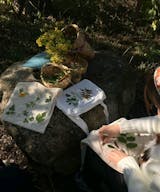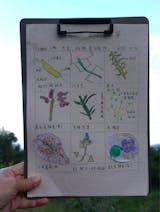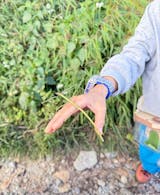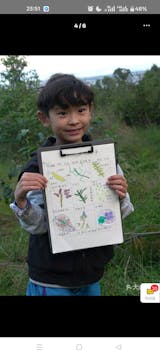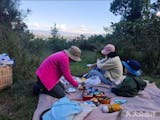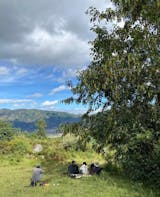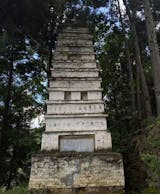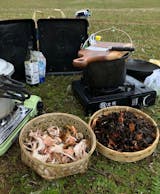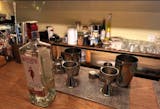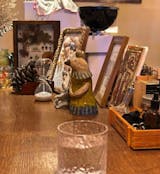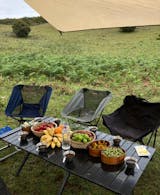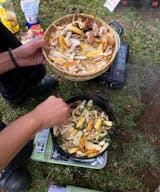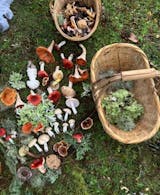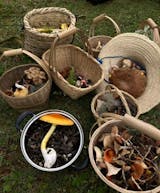
Jason | Mehdi in Isfahan
Last night, I arrived in Isfahan and checked into the youth hostel. Others went to eat, and I took a taxi to Azin's house. The distance was not far, and the taxi took about 15 minutes. On the way from Kashan to Isfahan, I agreed with her that her father would be home later.
After waiting for a while at her doorstep, a car pulled up to the roadside. A middle-aged Iranian woman got out of the passenger seat. I guessed it was Azin's mother, but I was surprised. Did she come back from Canada?
Last year, around this time, I traveled to Isfahan and stayed at her homestay. I just randomly found it on the map, and it looked highly rated. But when I got there, it didn't feel like a homestay, it was just a homestay. Inside the house was a young girl (who looked a bit like a boy) and her grandfather. She said her father would come over soon and take us to another house.
Her father Mehdi was a serious, depressed middle-aged man in his fifties. He didn't give us a warm reception at all. He drove us to a courtyard like a prisoner and didn't say a word on the way. There were no other guests there. The courtyard looked run-down and no one had lived there for a long time. After arranging the room and explaining how to open and close the door, he left without a smile. We thought we could only stay here for one night at most.
Although the yard is a little run-down, there are trees and flowers, but no one else, and it is very comfortable. Outside is the living area, with many alleys and various small shops scattered around, selling vegetables, fruits, groceries, and coffee shops, which is very suitable for walking. The next morning, I went to the nearby supermarket to buy vegetables and cook for myself. I soon got tired of eating barbecue and pizza. Mehdi came from his nearby workplace at noon to check on the situation, and he was probably a little worried. We invited him to try the stir-fried green peppers we made. He tasted a little cautiously, and then tasted a little more, and asked: "Can you make this aroma with just oil? Did you use oil?"
From then on, we started chatting until he had to go back to work. He asked me countless Chinese and international questions in very basic English. He also told me that he was a manager of an electric power company and earned $300 a month, which was considered good in Iran. But compared to the best salary of $2,000 when he was young, the current conditions are much worse than before. My wife has now gone to Canada, she went there on a tourist visa, and stayed there with a work visa as an Iranian, but she doesn't want to go there. "I don't speak the language well, what can I do there? I don't want to go."
Mehdi's daughter Azin came to play in the evening. She is a chemistry major at Isfahan University. She said that her mother used all the money in her grandfather's card to buy a plane ticket and lied to him that she was going on a trip together, but she actually wanted to stay in Canada. Her grandfather was very angry. My mother used to do "cooking classes" for foreign tourists. Her English was very good. Because of the street riots caused by the epidemic and the anti-headscarf movement, Western tourists almost disappeared and business plummeted. "There is no hope in life," she wanted to go to Canada by herself and take her daughter out. However, her application for a visa for her daughter was rejected. Azin wanted to learn English to take the TOEFL and apply for studying abroad, but it was difficult. "There is no hope in Iran, I want to leave," she said. As a young person with new ideas, I feel angry and hopeless about the repressive and conservative social atmosphere and the economy locked by US sanctions. This reminds me of China in the 1980s. The outside world was vibrant and rich. Everyone wanted to go out at all costs, but going out was difficult and ups and downs.
We stayed one more night, and didn't want to leave, so we stayed another night. Every day, we went out of the alley to buy groceries and cook. Mehdi sneaked back from the company several times a day, chatted with us, and then tried to take out different things for us to eat and drink tea together. A serious and depressed middle-aged man turned into a person who looked serious but was actually cute and humorous. The days in Isfahan were almost no tourist attractions, but it was a good time.
Unexpectedly, my mother Maryam came back this time. She is a warm person, very capable, and the head of the family. We sat on the sofa and chatted. Grandpa sat on the carpet. His legs were not convenient, but his eyes were clear and energetic. Last year, when granddaughter Azin greeted us, he reminded her not to forget to serve tea. He could observe every detail.
Maryam said that after living in Canada for 11 months, she decided to return to Iran: "I still miss home a little bit. Since I can't take my daughter there, there is no point in me staying there." She continued to run a homestay, receiving local Iranian tourists. She wanted to continue cooking classes, but there were no foreign guests. She asked me if I could promote her on WeChat, but I thought it was not that simple. Besides, the yard where we used to live and take cooking classes could not afford the rent, so we returned it to the landlord.
While we were chatting, a large bowl of Ash (a thick soup) that looked like pickled vegetable noodles was served as dinner. It was said to be the style of Mehdi’s hometown, Mahdieh, a rural town dozens of kilometers away from Isfahan.
Azin continued to take classes at Isfahan University and had an exam tomorrow. I gave her a pair of Xiaomi bone conduction headphones, hoping that she would use them when learning English so that her ears would not feel uncomfortable. I personally think that this type of headphones is more suitable for long-term listening to classes. Mehdi was still as cute as ever. He was very happy to see me, but because Maryam was back, he could not get a word in. He also said that he got up very early in the morning and was very sleepy. He slept on the couch in the yard. He woke up when I left and said goodbye to me in a daze. They invited me to come again the next day.
I woke up at 6:30 the next morning and received several WeChat messages saying that Iran had attacked Tel Aviv, the capital of Israel, in the middle of the night. Out of concern for war, I woke up the others, changed my plan, and left Isfahan for Shiraz.
2024.04.14




